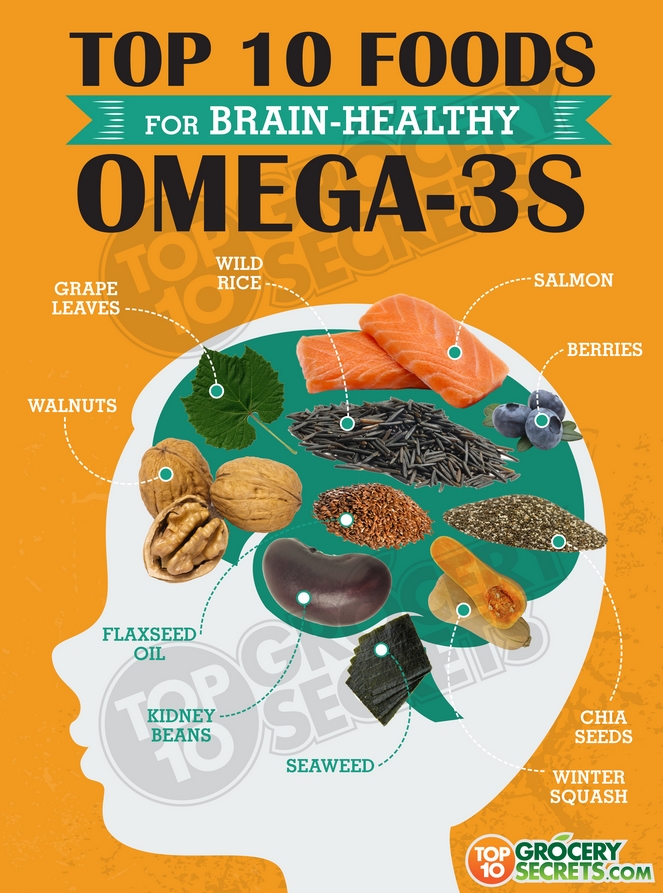Omega 3 fatty acids are crucial to proper brain nourishment, throughout life according to recent research
12/29/2017 / By Ralph Flores

Omega-3 fatty acids, the essential fat that our bodies can’t seem to produce, is important for long-term brain development, according to a study conducted by Inserm and the National Institute of Agricultural Research (INRA). It also noted that a lack of this essential fat in our system can lead to a depressed state of mind.
The fast-paced growth of western society has led to a dynamic shift in food choices over the years. This has led to a steep decline in the consumption of the omega-3 fatty acid, which is abundantly found in oily fish such as salmon as well as nuts and grain products such as flax, soybean and chia seeds. This type of deficiency in the diet poses risks to people today, as a lack of omega-3 in our system can lead to mental disorders such as depression and stress. Thus, the research team undertook the research to provide a better understanding of the correlation between an imbalanced diet and mental health disorders.
The team undertook the task by testing the effects of omega-3 deficiency from adolescence to adulthood on mice. They were able to observe how a low omega-3 diet starting from pre-adulthood reduces the level of the fatty acids in the prefrontal cortex, an area of the brain that is responsible for psychological functions such as decision making, executive control and reasoning, and the nucleus accumbens, an area of the brain that deals with reward-related cognition and the control of emotions. This resulted in noticeable anxiety during adulthood, as well as a diminished cognitive function in adulthood.
Researchers then analyzed the basic processes that govern these outcomes. They were able to find out that two primary forms of neuronal learning that were affected in the prefrontal cortex and the nucleus accumbens in mice that lacked the omega-3 fatty acid.
In order to address treatment for the deficiency, the study noted two methods in restoring the brain function and both the cognitive and emotional behavior that a lack of omega-3 causes. Lead researchers Olivier Manzoni and Sophie Laye explain: “We simply had to enhance the capacity of mGlu5 (the receptor for glutamate, the most important neurotransmitter in the central nervous system) in the neurons in order to re-establish communication, or inhibit the degradation of the main cannabinoid naturally secreted by the brain, which controls synaptic memory.”
The outcomes of the study propose that nutrition is an important part of understanding brain capacity and behavior from adolescence to well into adulthood. The study also recognizes the risks that a diet lacking in omega-3 can bring, especially in neuropsychiatric disorders. The study also highlights possible treatments that can be used to address any imbalance of the omega-3 fatty acid.
Omega-3 fatty acids are an important part of the cell, as they are responsible for the creation of hormones that regulate blood clots and relax artery walls. It is also known as a type of polyunsaturated fat, which is known to be beneficial in preventing heart disease and stroke, and control lupus, eczema and arthritis. Omega-3 fatty acids are also known to help in protecting the body against cancer. (Related: The Powerful Role of Omega-3 Fatty Acids in Preventing Diseases of Inflammation: The Experts Speak.)
According to the National Institutes of Health, alpha-linolenic acid (ALA), one of the types of omega-3 fatty acids, can be consumed at a recommended amount depending on a person’s age and sex. These can range from 0.5 grams each day for babies to 1.6 grams per day for men.
Some of the food that you can consume to ensure you have the daily recommended amount of omega-3 include fatty fish (especially cold-water fatty fish like salmon, tuna, and mackerel) and seafood, nuts and seeds, plant oils and fortified food.
Find more stories about the brain and how to keep it healthy at Brain.news.
Sources include:
Tagged Under: ALA, brain development, brain health, cognitive health, disease prevention, effects of stress, emotional behavior, essential fat, fatty acid, healingfoods, hormone health, mental health, mind body health, natural remedies, nutrients, nutrition, omega 3 deficiency, omega3, prevent depression, research
RECENT NEWS & ARTICLES
COPYRIGHT © 2017 BRAIN NEWS


















